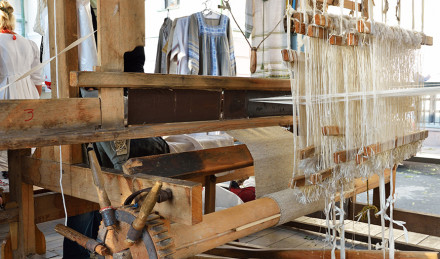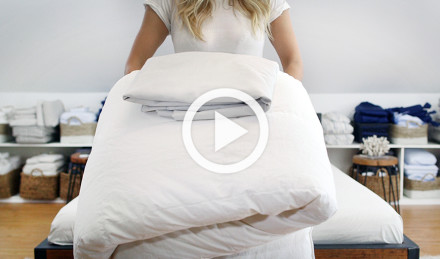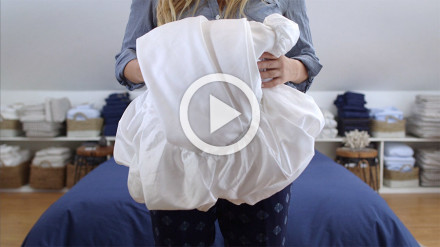By working directly with the best European factories, Parachute is able to offer superior products at a lower cost. Our Portuguese manufacturers are considered among the most distinguished in the industry, but many people are unaware of the country’s history in the textile trade. Dating back to the late 1700s, Portugal’s textile business has proven to be as strong and resilient as the linen the artisans weave.
How it Started
Because of colonial influences in Brazil, Portugal’s cotton industry took form during the eighteenth century with production centered in Lisbon. By importing the necessary machinery from Britain, the Portuguese were able to outfit dozens of factories and set their economy in motion.
By the time the nineteenth century rolled around, Portugal had begun to explore another niche within the textile industry: Linen production. With flax fibers imported from Hamburg, the country was well-positioned to specialize within the industry – especially in northern regions, like the city of Guimaraes where a collection of small rivers provided the necessary water supply. Some linen producers spun fibers, while others wove them together to form the impressive fabrics we use here at Parachute. Linen was particularly popular for use in garments; the dyeing process was free of harsh, irritating chemicals and yielded a supple textile that became increasingly soft with laundering. Unlike the cotton industry, the linen trade was not factory-based. It began as a domestic pastime, and people would weave their own linens on small, household looms.
To learn more about the exciting history of European linen, explore the Why European Linen Fabric is the Best in the World guide.
How it Started
Because of colonial influences in Brazil, Portugal’s cotton industry took form during the eighteenth century with production centered in Lisbon. By importing the necessary machinery from Britain, the Portuguese were able to outfit dozens of factories and set their economy in motion.
By the time the nineteenth century rolled around, Portugal had begun to explore another niche within the textile industry: Linen production. With flax fibers imported from Hamburg, the country was well-positioned to specialize within the industry – especially in northern regions, like the city of Guimaraes where a collection of small rivers provided the necessary water supply. Some linen producers spun fibers, while others wove them together to form the impressive fabrics we use here at Parachute. Linen was particularly popular for use in garments; the dyeing process was free of harsh, irritating chemicals and yielded a supple textile that became increasingly soft with laundering. Unlike the cotton industry, the linen trade was not factory-based. It began as a domestic pastime, and people would weave their own linens on small, household looms.
To learn more about the exciting history of European linen, explore the Why European Linen Fabric is the Best in the World guide.
Economic Downturn
Today, the Portuguese textile industry accounts for about 9% of the country’s output. Ninety percent of the textiles produced are intended for export, with 40% destined for the United States. Unfortunately, like many countries, Portugal is still weathering the effects of the 2008 global recession. The textile industry reflects this, as unemployment increases and production decreases. Over the last decade its output has dropped by nearly 30%. The low-cost competition of China – at a reduction of 60-70% – makes this uphill battle even more difficult.
Economic Downturn
Today, the Portuguese textile industry accounts for about 9% of the country’s output. Ninety percent of the textiles produced are intended for export, with 40% destined for the United States. Unfortunately, like many countries, Portugal is still weathering the effects of the 2008 global recession. The textile industry reflects this, as unemployment increases and production decreases. Over the last decade its output has dropped by nearly 30%. The low-cost competition of China – at a reduction of 60-70% – makes this uphill battle even more difficult.
Reinvigorating the Industry
However, with a history so intertwined with the textile industry, Portugal remains irrepressible. The small northern city of Guimaraes provides a fantastic example of how the country is dealing with economic downturn. Formerly home to a number of textile plants, Guimaraes has witnessed the gradual abandonment of factories – broken windows revealing unmanned looms and empty storerooms. Nevertheless, several resilient companies remain intact, like our manufacturers, with plans of extending – and reinvigorating – the Portuguese fabric trade for years to come.
Reinvigorating the Industry
However, with a history so intertwined with the textile industry, Portugal remains irrepressible. The small northern city of Guimaraes provides a fantastic example of how the country is dealing with economic downturn. Formerly home to a number of textile plants, Guimaraes has witnessed the gradual abandonment of factories – broken windows revealing unmanned looms and empty storerooms. Nevertheless, several resilient companies remain intact, like our manufacturers, with plans of extending – and reinvigorating – the Portuguese fabric trade for years to come.
Designed in Venice Beach, Made in Portugal, Delivered to Your Door
Feel the difference firsthand when you make your bed with Parachute. Our Quilts, Heathered Stripe Duvet Sets and linen line are all made in the Guimaraes region of Portugal, offering a luxurious sleep experience deeply steeped in a tradition of excellence.
Designed in Venice Beach, Made in Portugal, Delivered to Your Door
Feel the difference firsthand when you make your bed with Parachute. Our Quilts, Heathered Stripe Duvet Sets and linen line are all made in the Guimaraes region of Portugal, offering a luxurious sleep experience deeply steeped in a tradition of excellence.




